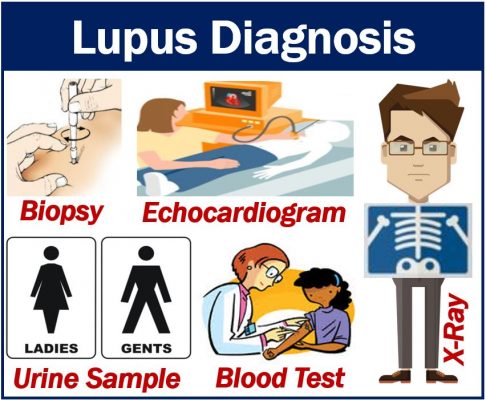The right lupus diagnosis, i.e., an accurate one, may elude some patients for a long time. A lupus diagnosis is difficult because there are so many possible signs and symptoms. No two cases are ever the same, doctors say.
Doctors sometimes refer to lupus as ‘the great imitator‘ because its signs and symptom also exist in other diseases and conditions.
Lupus signs and symptoms exist in heart, lung, bone, and muscle diseases. They are also present in Lyme disease, blood disorders, fibromyalgia, rheumatoid arthritis, thyroid problems, and diabetes.
Therefore, a patient might see one of many different types of medical specialists.
Lupus diagnosis often not obvious
The Lupus Foundation of America makes the following comment regarding a patient’s lupus diagnosis:
“A diagnosis of lupus may be made by any physician (family practitioner, Internist, or pediatrician) if multiple symptoms and laboratory test results point toward the disease.”
“However, if symptoms develop gradually over time, as is often the case with lupus, the diagnosis may not be as obvious, and there may be visits to multiple physicians before a diagnosis can be confirmed.”
This article is one of many in our Lupus Hub, which has the following themes or titles:
1. What is lupus?
2. Signs and symptoms of lupus.
3. Lupus treatment options and self-help measures.
4. Causes of lupus.
5. Lupus medications that doctors prescribe.

Lupus diagnosis – rheumatologists
In most cases, a rheumatologist carries out a patient’s lupus diagnosis, but not always. The type of doctor lupus patients see depends on the signs and symptoms they have.
A rheumatologist, for example, makes a lupus diagnosis if the patient has mild to moderate disease. Rheumatologists specialize in diseases of the joints. They also specialize in muscle problems.
Lupus diagnosis – many other specialists
Given that the disease can affect so many parts of the body, lupus diagnosis and treatment may involve a wide range of medical professionals.
Kidney problems
Patients with kidney problems see a nephrologist.
Skin problems
People with skin problems, such as those with cutaneous lupus, see a dermatologist.
Brain and nervous system problems
If the disease affects the nervous system and brain, the patient sees a neurologist.
Stomach and gut problems
Patients with signs and symptoms in their stomach, esophagus, or intestines see a gastroenterologist.
Cardiovascular problems
People with heart or circulation problems see a cardiologist.
Pregnancy problems
If the lupus patient is pregnant, she may see a perinatologist. Perinatologists treat high-risk and or complicated pregnancies.
Lung problems
Lupus patients see a pulmonologist if they have lung problems.

Lupus diagnosis – imaging tests
If the doctor wants to check the patient’s heart or lungs, he or she may order some imaging tests.
Echocardiogram
We also call it an ‘echo.’ It is an ultrasound scan that looks at the heart and blood vessels nearby. It uses sound waves to produce moving images, i.e., real-time video, of the patient’s beating heart.
The healthcare professional can check for heart problems.
Chest X-ray
This is a painless and quick procedure. An X-ray or radiogram produces images of the inside of the body.
X-rays are a type of invisible radiation that can pass through the body. Different parts of the body absorb their energy at different rates. A detector picks up the X-rays on the other side of the body and then converts them into an image.
By examining the images, doctors can determine whether there is inflammation or fluid in the lungs.
Lupus diagnosis – blood tests
When an invader, such as a harmful bacterium, enters the body, antibodies form to fight it. White blood cells, which we call ‘B lymphocytes,’ make these antibodies.
A lupus patient’s body, however, produces antibodies even when no harmful invader is present. The antibodies attack good cells as though they were invaders. This is why lupus patients suffer inflammation. They also suffer cell damage.
We call antibodies that attack good cells ‘autoantibodies.’
Anti-nuclear antibody blood test
Anti-nuclear antibodies or ANAs attack the cell’s nucleus; they should not do this. Ninety-eight percent of lupus patients test positive for ANAs.
According to the Johns Hopkins Lupus Center, the ANA blood test is “the most sensitive diagnostic test for confirming diagnosis of the disease.”
If a patient’s ANA blood test comes back positive, the doctor will recommend further blood tests to check for additional antibodies. These extra tests can help confirm a lupus diagnosis.
Additional blood tests can identify the following autoantibodies: anti-dsDNA antibody, anti-Smith antibody, anti-U1RNP antibody, anti-Ro/SSA & anti-La/SSB antibodies, and anti-histone antibodies.
Serum complement test
The inflammatory process consumes proteins in the blood. Therefore, low protein levels suggest that there is inflammation in the body.
Liver and kidney assessment
Blood tests can tell us how healthy a patient’s kidneys and liver are. Lupus can affect the liver and kidneys.
Lupus diagnosis – urine test
A urine test or urinalysis can tell us whether the patient has kidney problems. Higher levels of protein or red blood cells suggest that something is wrong with the kidneys.
Lupus diagnosis – biopsies
A biopsy involves removing tissue from a living body and examining it. In this case, therefore, it refers to removing tissue from a patient’s body.
Skin biopsy
If a patient has rashes or sores on their face, chest, scalp, or arms, they have cutaneous lupus. Cutaneous refers to the skin.
A dermatologist may remove a small sample of skin to examine it.
Kidney biopsy
The doctor may also order a kidney biopsy. This involves taking a small sample of kidney tissue and then examining it.
According to the National Kidney Foundation, the doctor places a needle through the skin that lies over the kidney. In most cases, he or she also uses ultrasound to guide the needle to the right place.
If the patient is undergoing surgery, the surgeon will take a sample directly from the kidney.
Interesting Related Article: “How Does a Home DNA Test Work?“
